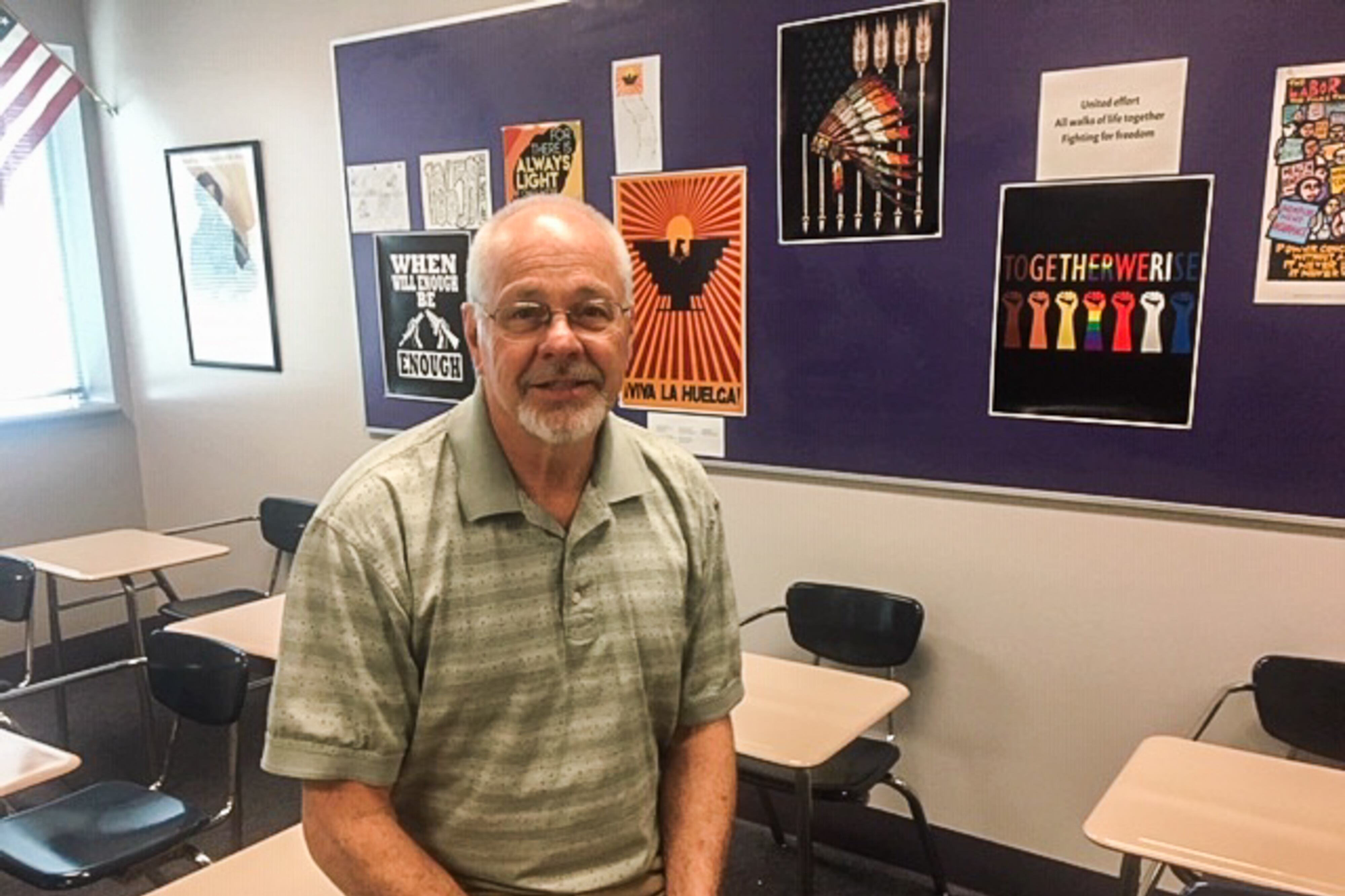John Gallup, a history teacher at Arvada West High School northwest of Denver, believes students really listen when teachers have first-hand experience with a topic.
That’s why he jumped at the chance to participate in the Auschwitz Legacy Fellowship, a new program to educate American high school teachers about one of the Holocaust’s most notorious concentration camps.
“Within the next 10 or so years, we will have no survivors of this horrific experience to share their stories,” he said. “I want to carry that torch as best as I can.”
(Even Nazi victims who were young children during the Holocaust are now elderly.)
Gallup is one of 32 high school teachers from five states selected for the inaugural fellowship class. This summer, he’ll visit Warsaw and Krakow in Poland and tour the Auschwitz Memorial. Some 1.1 million people, including 1 million Jews, were murdered at Auschwitz.
As he prepares for the solemn trip, Gallup talked to Chalkbeat about his journey from golf professional to classroom educator, why he’s become a more compassionate teacher over the years, and what he’s reading before heading to Poland.
This interview has been lightly edited for length and clarity.
Was there a moment when you decided to become a teacher?
I was 45, recently married, and in the process of adopting two kids. Plus, as soon as we decided to adopt, my wife got pregnant. I went from being single to married with three children — one 6 and two under 1-year-old — in about eight months. I felt my past career as a golf professional would limit my time with my children and my ability to be the dad I wanted to be.
I took a paraprofessional position at Jefferson High School and loved being in the classroom. That was my aha moment. I immediately applied to Metro State University because I needed to finish college. I spent the next two years in school and finished summa cum laude.
Why did you apply for the Auschwitz Legacy Fellowship, and what do you hope to learn during the program?
This was really a no-brainer. What history educator would not want to have this opportunity? I already had a good relationship with the Counterterrorism Education Learning Lab, or CELL, which partners with the Mizel Museum in Denver. They contacted me with this opportunity, and I jumped at the chance to study on-site in Poland.
There is one way that a history teacher can absolutely grab students’ attention, and that is having “I’ve been there” experiences. Credibility is key. Additionally, this is one area of our history that I find fascinating and important to keep alive.
How do you currently incorporate study of the Holocaust into your classes?
Since I teach American history, my instruction of the Holocaust is limited. I focus on the societal causes and the complicity of normal citizens in the implementation of Hitler’s “Final Solution.” I also focus on politics and rhetoric, and address the questionable actions by the United States and other countries in failing to respond to threats to Europe’s political stability and threats to the Jews in Europe and Russia.
Tell us about a favorite lesson to teach.
I have a lesson that analyzes a poem written by a local civil rights activist, Corky Gonzalez. It’s called, “I am Joaquin.’’ I created this analysis a few years ago to have students reflect on Chicano rights and the challenges of assimilation, and the losses felt by those for whom assimilation is expected. We then connect this to the movie “Viva La Causa” and the battle for justice led by César Chávez in the Delano Grape Strike and the subsequent national consumer boycott.
Tell us about a memorable time — good or bad — when contact with a student’s family changed your perspective or approach.
I am regularly presented with outside-of-school challenges that impact student success in school. My perspective from early in my career, 16 years ago, and today has changed as I have become more cognizant of the many outside factors that impact students’ school lives. I now show much more grace and compassion.
What’s something happening in the community that affects what goes on in your classroom?
Community is such a broad term, so I will broaden it more: The crisis in Ukraine is having an impact in my classroom. I just finished a unit on the Vietnam War and am still in the latter parts of the Cold War. We have looked at similarities between political decisions and the issue of regime change. We also have done a brief comparison of the events leading the United States to invade Iraq and the similarities or differences with Russia’s invasion of Ukraine. Challenging students to find connections, similarities, cause, and effect between events of the past and today make them self-aware in today’s society.
What was your biggest misconception that you initially brought to teaching?
Students are not traditionally aware of the outside world beyond their immediate high school bubble. I thought they would be more aware of events happening in America and the world. I understand that my job is to present history in a way that creates this interest in modern events and link them to historical changes over time.
My biggest tool is my willingness to talk about hard history or difficult events in my classroom. I don’t fear tough discussions. Being open, honest, and direct with my students shows that I respect them, talk with them as adults, and am willing to engage in strong academic discussions of difficult topics.
What are you reading for enjoyment?
I enjoy reading books by Erik Larson. He writes nonfiction that reads like fiction, most notably “Dead Wake,” “Isaac’s Storm,” and “Thunderstruck.” Currently, in preparation for the trip to Auschwitz and Poland, I am reading “Ordinary Men” by Christopher Browning, which is about the Reserve Police Battalion 101 and the atrocities they perpetrated as part of Hitler’s “Final Solution.”







